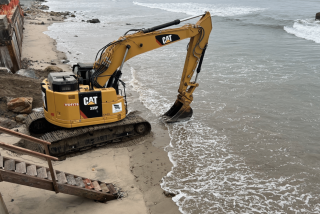Bill to give Coastal Commission power to levy fines is rejected
- Share via
The state Assembly killed a measure Tuesday that would have granted stronger enforcement powers to the California Coastal Commission.
A bill granting the agency the authority to impose fines on violators failed on a 34-30 vote, delaying the issue at least until next year.
Under current law, the agency that for four decades has overseen land use and public access along California’s 1,100-mile coastline must go to court to collect penalties from those who harm coastal habitat, build without permission or block public access to the beach in violation of the California Coastal Act. The process is time-consuming and expensive, enabling many violators to continue breaking the law for years.
The commission has long sought the ability to issue fines to start clearing its backlog of more than 1,900 enforcement cases, but it has repeatedly faced opposition from business groups and agricultural interests that say the agency already wields too much power.
The measure passed the Assembly in May on a 42-32 vote. The Senate amended the measure and approved it by a single vote Friday, sending it back to the Assembly to consider the revised version.
Sarah Christie, the Coastal Commission’s legislative director, said the opposition misrepresented the Senate’s amendments to cast doubt on the bill.
“They were able to confuse enough members to kill the bill,” she said. “Some members had questions, and other members were just looking for an excuse not to vote for the bill.”
Republicans generally opposed the measure, saying it would give the commission undue latitude and result in hefty fines. Assemblyman Curt Hagman (R-Chino Hills) said the bill would give the commission “way too much unchecked power.”
Despite the Republican opposition, backers of the legislation blamed its defeat on moderate Democrats who used the Senate amendments as cover to withdraw their support for a bill that was being heavily lobbied against by business interests.
Assembly Majority Leader Toni Atkins (D-San Diego), the bill’s sponsor, said she was disappointed that some lawmakers who initially voted for the bill decided not to vote for it even after it was amended and narrowed to address their concerns.
“I think our coastline is worth having the protections that this bill would have provided,” Atkins said.
The bill’s defeat followed a lengthy and fierce debate over public access to the beach and the power of the 12-member Coastal Commission, which was formed by voter initiative in 1972 and made permanent through the 1976 Coastal Act.
“This is a major victory for coastal landowners of all stripes — from homeowners big and small, to farmers,” Paul Beard II, an attorney for the Pacific Legal Foundation, one of the agency’s leading critics, wrote in a blog post.
Ann Notthoff, California advocacy director of Natural Resources Defense Council, said the defeat was a step backward for coastal management and environmental policy.
“People can continue to ignore the rules we have for coastal protection with impunity, and our natural resources and public access are going suffer for that,” Notthoff said.
The agency’s backlog of Coastal Act cases include those involving unpermitted development in coastal wetlands and illegal dumping and grading. The most common violations involve blocked coastal access, such as Malibu residents who have put up fake “no parking” signs to keep visitors from public beaches.
It was the third failed attempt by state lawmakers to enable the commission to issue fines since 2008, when a report by the nonpartisan state Legislative Analyst’s Office recommended granting the agency that power.
More to Read
Sign up for Essential California
The most important California stories and recommendations in your inbox every morning.
You may occasionally receive promotional content from the Los Angeles Times.











